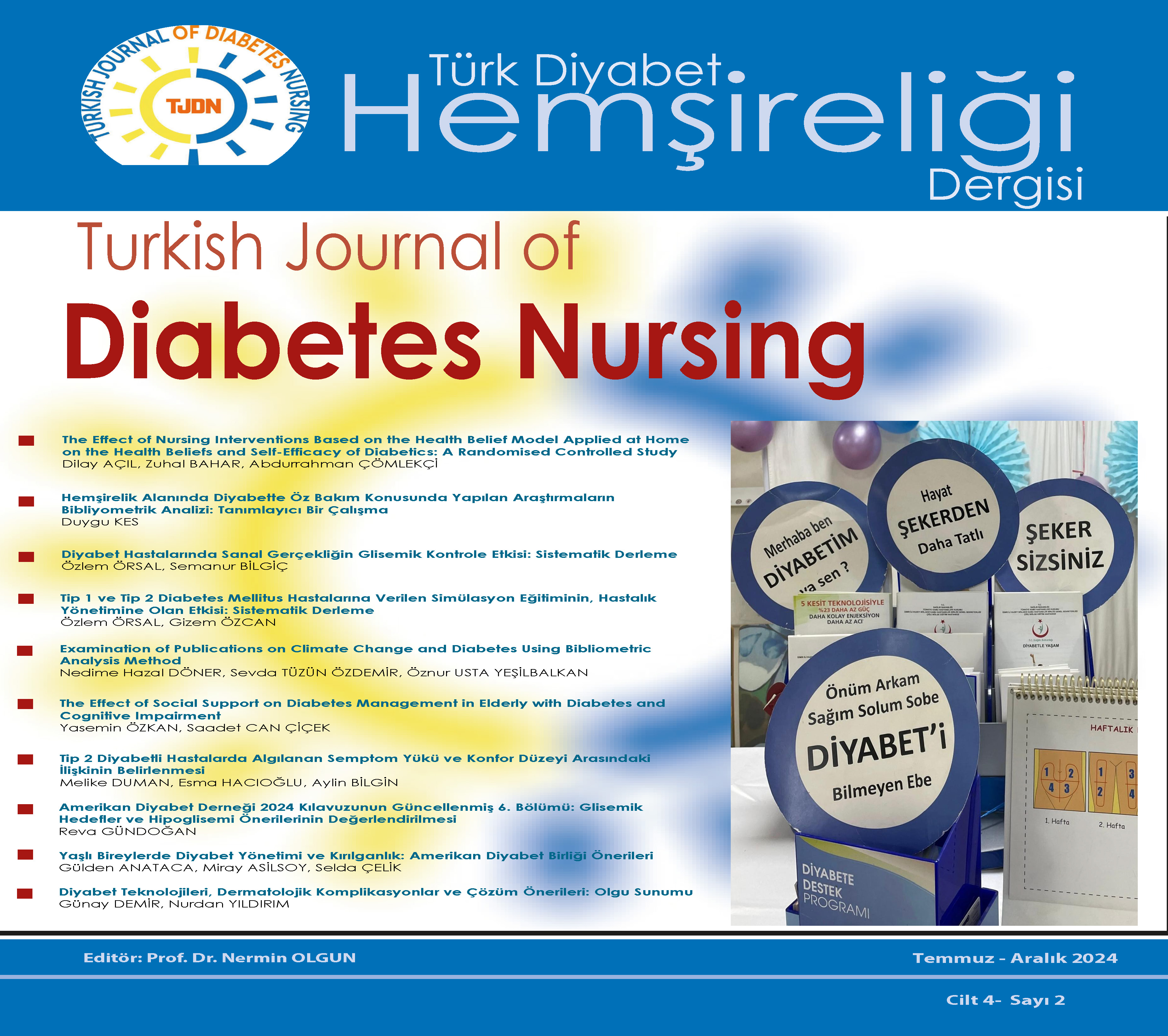Author :
Abstract
Amaç: Bu çalışmanın amacı bilişsel bozukluğu olan diyabetli yaşlılarda sosyal desteğin diyabet yönetimine etkisini belirmektir.
Yöntem: Bu çalışma, Türkiye’deki bir kamu hastanesinin Geriatri Kliniği’nde yatarak tedavi alan ve bilişsel bozukluğu olan 113 diyabetli yaşlı ile kesitsel tipte gerçekleşmiştir. Veriler; Tanıtım Formu, Yaşlılar için Yeniden Düzenlenmiş Mini Mental Test, Diyabet Öz Bakım Aktiviteleri Anketi, Diyabet Bakım Profili Ölçeğinin “Destek Tutumları” alt boyutu ve KATZ Günlük Yaşam Aktiviteleri ölçeğiyle elde edilmiştir. Veriler ANOVA, Mann- Whitney U, Kruskal Wallis, Tukey testi ve Pearson korelasyon analizi ile p˂0.05 anlamlılık düzeyinde değerlendirilmiştir.
Bulgular: Katılımcıların yaş ortalaması 74.32±7.28 yıl, %56.6’sı kadın, diyabet tanı yılı 18.72±9.48 yıl, glikolize hemoglobin düzeyi 9.1±2.0 olarak belirlenmiştir. Diyabet Öz Bakım Aktiviteleri Ölçeği ortalama puanı 14.43±4.66, Diyabet Bakım Profili Ölçeği Destek Tutumları Alt Boyutuna ilişkin olarak beklenen sosyal destek ortalama puanı 4.83±0.92, alınan sosyal destek ortalama puanı 4.47±1.08 ve algıladıkları sosyal destek ortalama puanı 3.11±0.35, KATZ Günlük Yaşam Aktiviteleri Ölçeği ortalama puanı 8.27±3.31 olarak belirlenmiştir. Bilişsel bozukluğu olan diyabetli yaşlılarda çalışma durumu ve sosyal destek puanı arasında anlamlı ilişki bulunmuştur (p˂0.05). Sosyal destek ile glikolize hemoglobin değeri arasında negatif yönlü anlamlı doğrusal bir ilişki belirlenmiştir (p<0.05). Sosyal destek ile KATZ günlük yaşam aktiviteleri puanı arasında negatif yönlü anlamlı doğrusal bir ilişki saptanmıştır(p<0.05).
Sonuç: Sosyal destek bilişsel bozukluğu olan diyabetli yaşlılarda diyabet yönetimi üzerinde anlamlı bir etkiye sahiptir. Bireyin aldığı sosyal destek arttıkça, glikolize hemoglobin değeri ve bağımsızlık düzeyi azalmaktadır. Bilişsel bozukluğu olan diyabetli yaşlılarda sosyal desteğe sahip olmak, diyabetin olası komplikasyonlarının önlenmesinde ve yönetiminde önemli bir role sahiptir. Hemşireler bilişsel bozukluğu olan diyabetli yaşlıların sosyal destek sağlayıcılarına eğitim vererek diyabet yönetimini koordine edebilir ve gelişebilecek olası diyabet komplikasyonlarını önleyebilir.
Keywords
Abstract
Objective: This study aims to determine the effect of social support on diabetes management in elderly individuals with diabetes and cognitive impairment.
Method: This study was conducted as a cross-sectional study with 113 elderly individuals with diabetes and cognitive impairment who received inpatient treatment in the Department of Geriatrics of a public hospital in Türkiye. Data were obtained from the Introductory Form, Revised Mini-Mental Test for the Elderly, Diabetes Self-Care Activities Questionnaire, "Support Attitudes" sub-scale of the Diabetes Care Profile Scale, and KATZ Activities of Daily Living scale. Data were evaluated by ANOVA, Mann-Whitney U, Kruskal-Wallis, Tukey test, and Pearson correlation analysis at a p˂0.05 significance level.
Result: The mean age of the participants was 74.32±7.28 years, 56.6% were female, the duration of diabetes was 18.72±9.48 years and the glycosylated hemoglobin level was 9.1±2.0. The mean score of the Diabetes Self-Care Activities Scale was found to be 14.43±4.66, the mean expected social support score regarding the Support Attitudes Sub-Dimension of the Diabetes Care Profile Scale was found to be 4.83±0.92, the mean score of received social support was found to be 4.47±1.08 and the mean score of perceived social support was found to be 3.11±0.35. The KATZ Activities of Daily Living Scale mean score was determined as 8.27±3.31. A significant correlation was found between employment status and social support score in elderly diabetic patients with cognitive impairment (p˂0.05). A significantly negative linear relationship was determined between social support and glycosylated hemoglobin value (p˂0.05). There is a negative significant linear relationship between social support and KATZ daily living activities score (p˂0.05).
Conclusion: Social support has a significant impact on the management of diabetes in elderly individuals with diabetes and cognitive impairment. As the social support an individual receives increases, the glycosylated hemoglobin value and level of independence decrease. Social support in elderly people with diabetes with cognitive impairment has an important role in the prevention and management of possible complications of diabetes. Nurses can coordinate diabetes management and prevent possible diabetes complications by educating social support providers of elderly people with diabetes with cognitive impairment.





